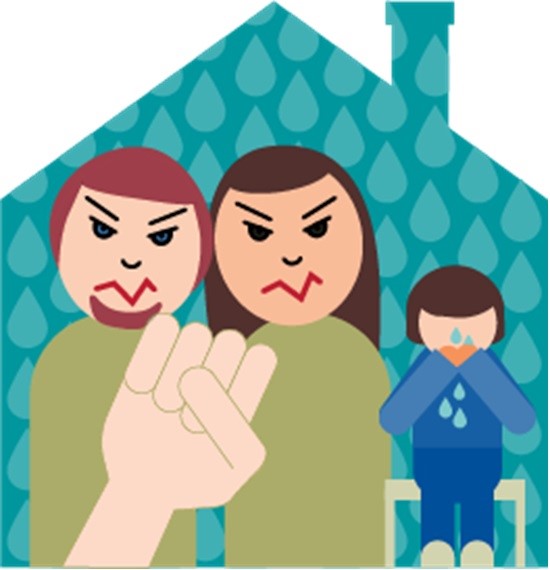Growing up in the shadow of domestic violence: impacts upon children & cost to society

When domestic violence takes place in families with children, it is not just the abused mum or dad who is a victim. The children are also victims and the consequences for them can be severe.
In 2017, the United Nations Children’s Fund reported that worldwide, one in four children under age 5 (176 million) live with a mother who is a victim of domestic violence. Because of this widespread occurrence and the profound impact it has on both its survivors and the broader community, domestic violence is a pressing public health concern with significant individual and societal implications.
In an article published in Child & Family Social Work, my colleagues and I provide evidence of the severe consequences experienced by children growing up in families with domestic violence. These children are also victims of this violence. They can be part of a dispute or consciously or unconsciously experience the results of physical or psychological violence on their parents or guardians.
To understand the effects of domestic violence on children, our study focuses on a specific group of children who, regardless of their pre-birth family history of violence or nonviolence, have experienced domestic violence between the ages of 0 and 8 (our target group). To draw accurate and meaningful insights, we have carefully selected a control group of children who, while not exposed to domestic violence during the same age range, share similar pre-birth family histories of violence or nonviolence, as well as parental socio-economic and geographical backgrounds as our target group. The study compares these two groups of children to draw meaningful conclusions.
In this manner, the study contributes valuable insights into the consequences of children’s exposure to domestic violence by examining a broad spectrum of outcomes within a total population. It follows complete cohorts of children and their parents, tracking their experiences from up to three years before the child’s conception and until the child reaches their 15th birthday.
Using administrative records from full cohorts of children in Denmark, the study extends previous knowledge in this field by assessing academic performance, PTSD diagnoses, and the likelihood of being placed in out-of-home care. Additionally, the study includes self-report data from the Danish National Well-being Survey (from the Ministry of Education) and calculates the additional societal costs resulting from children exposed to domestic violence by comparing the medical and social expenditures in the target and control groups.
The robust findings show a significant negative impact on academic performance, self-reported well-being in school, placement in out-of-home care and PTSD diagnosis. Both the target and control groups came from socially vulnerable families. Notably, children exposed to domestic violence exhibited even greater vulnerability across various domains, including mental health and schooling outcomes. For example, children exposed to domestic violence had seven more accumulated absence days during the school year, were twice as often placed in out-of-home care, and were diagnosed with PTSD one and a half times more often compared to children in the control group.
Computation from the register data reveals that 4% of children aged 0-8 have been exposed to domestic violence. Because of underreporting, this percentage is likely lower than the actual prevalence. Similarly, the estimated additional medical and child welfare system costs, which amount to $31,000 per child, should be considered as a conservative minimum.[1]
The findings align well with theories in developmental psychopathology (Cicchetti and Toth, 1995; Margolin & Gordis, 2004), trauma (De Bellis, 2001, and Eth & Pynoos, 1985), family systems (McLoyd, 1998), and growing evidence indicating that early-life experiences significantly impact the development of both cognitive and non-cognitive skills (Cunha et al., 2010).
Thus the study demonstrates that the consequences of growing up in the shadow of violence, closely resemble those of being a victim of violence. Although distinguishing between these experiences can be difficult.
This research is among the few register-based studies that explore the impact on children growing up in the shadow of violence. Moreover, it is the first study to calculate the societal costs associated with children indirectly experiencing domestic violence in Denmark.
Increasing preventive social interventions could play a pivotal role in mitigating long-term consequences by reducing both crime rates and social vulnerability. Future research endeavors should delve deeper into understanding how children’s exposure to domestic violence impacts outcomes related to crime and social vulnerability.
Notes
[1] All costs mentioned in this study were deflated to 2015 DKK (Danish Krone) and converted to USD (United States Dollar) using an exchange rate of 1 USD = 6.3 DKK for consistency and comparability.
References
Lyk-Jensen, S. V., Bøg, M., & Lindberg, M. R. (2023). Growing up in the shadow of domestic violence: Evidence from register data. Child & Family Social Work, 1–16. https://doi.org/10.1111/cfs.13096
Acknowledgements
Thanks to Martin Bøg and Malene Rudolf Lindberg, my co-researchers, and to the Egmont Foundation for funding the research project.
Author
Stéphanie Vincent Lyk-Jensen is senior researcher at the Danish Center for Social Science Research in Denmark. Her work focuses on quantitative methods to measure the impact of policies and interventions. Her research areas include behavioral economics, economics of health, labor economics and applied econometrics. Her research topics include mental health problems, education, crime, and violence.
VIVE conducts extensive research on domestic violence. This research encompasses knowledge gathering, national studies on the prevalence of physical, psychological, and sexual violence, as well as case studies on specific issues. These studies may focus on partner violence and homicides, partner violence within the LGTB+ community, parents who commit violence, abuse, or homicides against their children, and violence against ethnic minority women, such as during divorce proceedings.
VIVE also investigates the perspectives of those who have experienced violence, how children are affected by witnessing violence and homicides within their families, and how communities respond to partner violence. This knowledge is crucial for ensuring that interventions and further developments are implemented in the most suitable and effective ways.




1754-9469/asset/society_affiliation_image.gif?v=1&s=9197a1a6ba8c381665ecbf311eae8aca348fe8aa)